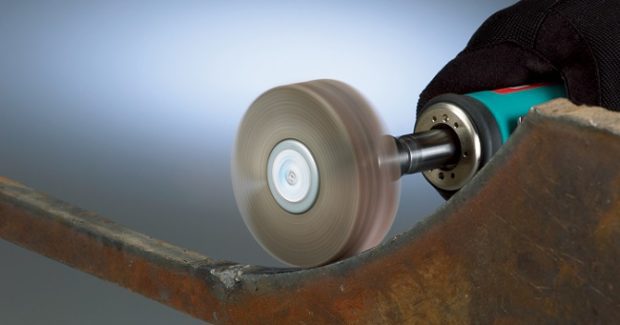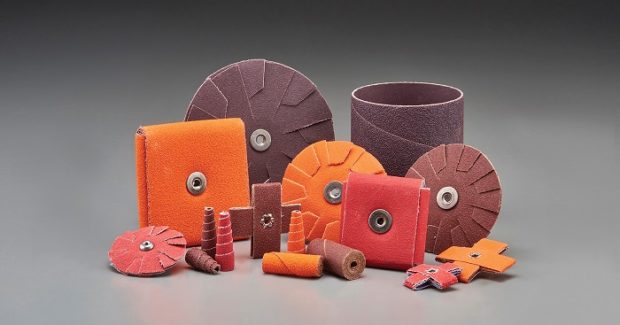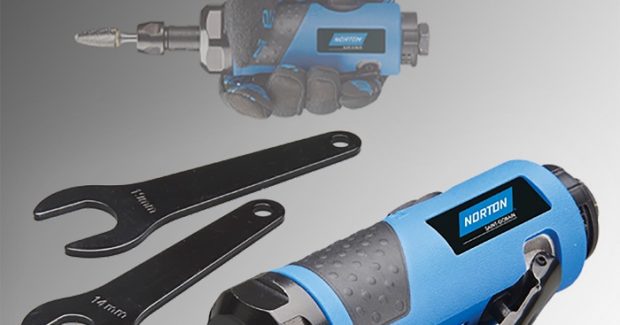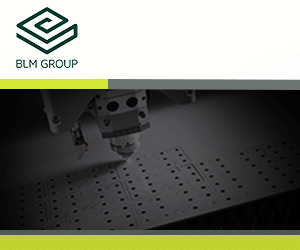No Job Too Small
The use of smaller abrasives and supporting tools is growing in shops that are less concerned about stock removal and heavy deburring but need to produce parts with fine finishes, want more control for less gouging of parts, and desire improved ergonomics.
Posted: April 15, 2019
A clear trend in industry today is the growing use of smaller abrasives and supporting tools. Why? Many manufacturers in metal fabrication, welding, energy, MRO, aerospace and other industries prioritize several features over others. Preferred capabilities being sought after include producing parts with fine finishes, having more control for less “gouging” of parts, and improved ergonomics. At the same time, depending on the application at hand, sometimes there is less concern about stock removal and heavy deburring. To meet these requirements, suppliers are offering “small” abrasives such as quick-change discs and flap wheels, mini flap discs, specialties such as cartridge and spiral rolls, square pads, harder mounted points and more. There are also non-abrasive products available, such as carbide burrs and wire wheels that provide many advantages, including extended life, better control of stock removal in intricate areas, and the ability to be used in higher temperature applications. Along with these new abrasives are new complementary tools, such as mini angle sanders and die grinders, to accomplish more intricate work.
Let’s take a closer look at two of these abrasives shapes and their usefulness: flap wheels and specialty solutions.
FLAP WHEELS
Flap wheels are available in coated abrasives, nonwoven abrasives and in a combination of both, popularly called interleaf flap wheels. All flap wheels have abrasive wrapped around the core. This construction allows the flap wheel to conform to intricate shapes and contours while providing a uniform rate of cut throughout the grind. A key characteristic of flap wheels is that they wear away evenly, exposing fresh abrasive cutting points. Coated flap wheels are best for deburring, nonwoven flap wheels are ideal for finishing, and interleaf flap wheels are best suited for blending applications. The most popular flap wheel sizes include 1 in x 1 in, 2 in x 1 in and 3 in x 1 in with ¼ in hole in 60, 80 and 120 grit. Most flap wheels use aluminum oxide abrasive grain for good cut rate and life, and the most popular backing is cotton for flexibility.
Figure 1 provides a good example where flap wheels are best used. Flap wheels deburr, blend and/or finish better than other products due to their unique structure and ability to provide a uniform rate of cut. However, flap wheels do not provide the life and overall cutting performance of bonded abrasive mounted points or carbide burrs.
SPECIALTY ABRASIVES
Specialty abrasives (specialties) are also available in coated abrasives and nonwoven abrasives. Specialties are used in corners where larger diameter shapes like flap wheels can’t be applied. Specialties remove flash, machine tool marks and are used for general polishing, edge breaking and removing parting lines.
Figure 2 provides a sampling of specialty shapes that are available, including coated spiral bands, cartridge rolls, tapered cartridge rolls, square pads, cross pads, overlap slotted discs and bore polishers, as well as nonwoven cross buffs and stars. Each has the unique ability to get into hard-to-reach areas and provide close tolerances, as well as deburr and finish small hole areas. An example of this functionality is found in cross pads that allow operators to see through the coated area while grinding, giving them better view of the workpiece and control of the process.
Specialties wear evenly, exposing sharp cutting points. The coated abrasive specialties are best for deburring, while nonwoven specialties have better finishing properties. The most popular specialties sizes are ¼ in x 1½ in x ¼ in and ½ in x 1½ in x ¼ in, which are significantly smaller than flap wheels. Most specialties use aluminum oxide abrasive grain for good cut rate and life. Popular grits used are 60, 80 and 120 and, like coated specialties, the most commonly seen backing is cotton for flexibility. Unlike flap wheels, the downside of specialties is that they are not functional on larger scale areas of contact.
STAINLESS STEEL APPLICATIONS
Specific to grinding stainless steel, a line of Norton Merit Pink R928 flap wheels and specialties has been introduced with superior ceramic grain that provides faster cutting and longer life over traditional aluminum oxide products. These flap wheels and specialties also have a poly cotton backing for longer life versus traditional cotton backing and offer a grinding aid for cooler cutting on harder-to-grind materials. To support these new abrasives, Norton offers a Handheld Pneumatic Die Grinder to accommodate the new flap wheels and specialties. It quickly and comfortably accomplishes a wide range of portable grinding applications without the need to change machines. Operators immediately notice a reduction in vibrations attributed to the grinder’s double-bearing spindle, resulting in longer tool life and finer finishes. Precision is as simple as adjusting the speed regulator, giving the operator complete control of the surface finish needed to complete the job. An ergonomic and streamlined non-slip grip achieves better tool handling, increased comfort and reduced grinding fatigue.
This die grinder is small and lightweight for additional control, with the ability to get into small features in parts. It has a free speed of 25,000 rpm to make quick work of deburring, light to medium surface cleaning and stock removal applications, welding preparation, and finishing. So mount up either a flap wheel or specialty abrasive for your next grinding job and experience the excellent finishes and productivity.
For more information, visit abrasives and also subscribe to F&M.


















